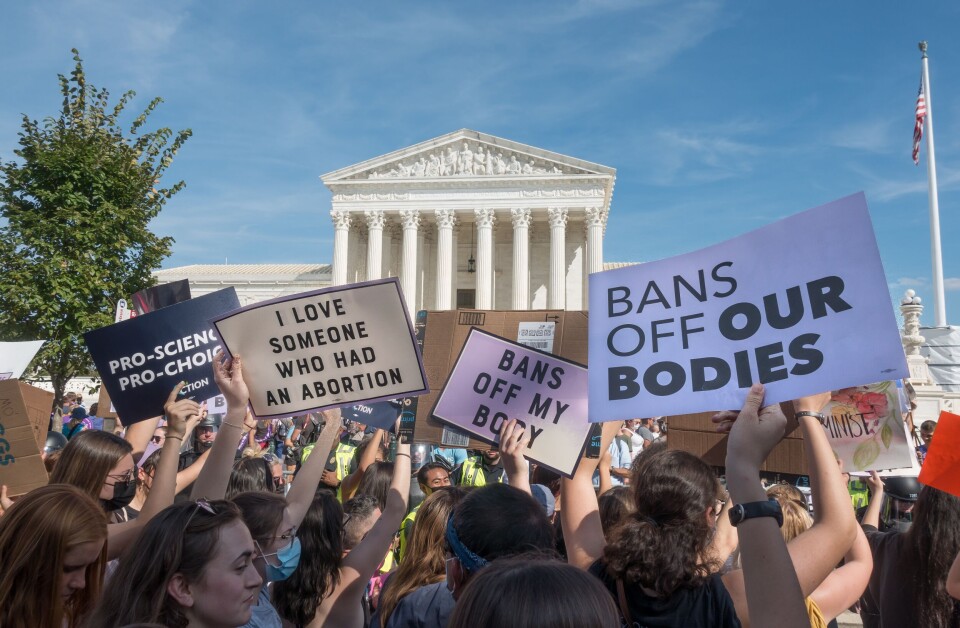-
Red flood alerts continue in south-west - and more heavy rain expected
Garonne river is particularly affected. French weekly weather forecast February 16 - 20
-
Why your car insurance in France is expected to increase this year
Premiums are forecast to rise by four to six percent in 2026
-
Two Britons killed in avalanche in French Alps were with an instructor
French skier also died in the disaster at Val d’Isère on Friday February 13
Americans demonstrate in Paris against US threat to abortion right
The women waved coathangers as a symbol of backstreet abortions; we look at the current abortion laws in the US, France and UK

American women demonstrated in Paris’s place du Trocadéro yesterday against plans in the US to reverse federal laws making abortion a right.
If the right is overturned by the Supreme Court, some states are expected to ban abortions, while others would not.
The current rights date from the 1973 Supreme Court case of Roe v. Wade.
The women, who numbered just over 100, waved coathangers, a symbol of the days when desperate women visited ‘back-street’ abortionists who used such objects to carry out risky abortions.
One of the protestors, ‘Olivia’, told FranceInfo: “My own mother had an illegal abortion in the 1950s in the US. She described it to me, and it was horrible. She almost died and it has remained a trauma for her.”
Another, ‘Christine’, said: “It will especially affect poor women and black women. Imagine if you have to have an abortion but you’ve got to cross a state the size of France to go to another state. It isn’t possible.”
According to abortion law expert Nicole Mason of the Institute for Women’s Policy Research, 13 US states have laws that would immediately restrict or ban abortion if the Supreme Court finalises its draft opinion overturning the 1973 law. A final decision is expected next month.
What is the situation in France for abortions?
In France abortion was legalised by the 1975 ‘Loi Veil’ law, named after then health minister Simone Veil, who supported it.
Read more: Thousands honour Simone Veil as she enters Panthéon
A ‘medication’ version of abortion is possible by taking prescribed drugs, but up to only seven weeks of pregnancy, after which it is necessary to use surgical instruments to remove the foetus.
In France an abortion is permitted on the woman’s decision, up to 14 weeks of pregnancy, the period having been extended from 12 earlier this year.
In comparison, the time-period in the US depends on the laws in the state and practices in different health centres, with periods from 12 to 24 weeks being allowed, or sometimes longer in rare cases for medical reasons.
In the UK abortions are permitted up to 24 weeks (the longest in Europe) or until birth for medical reasons, though most abortions are done before 13 weeks.
What is the process in France?
Before having an abortion a woman needs to have two medical consultations, during which a doctor (GP or gynaecologist) or midwife informs her about the process, and the woman makes the decision to have the procedure and chooses the method. A specific ‘psycho-social’ interview is also offered to discuss her situation further with a trained adviser.
A medical check-up consultation is also required around two to three weeks after the abortion.
Abortions are an exception to the rule by which you must see your own GP to obtain full reimbursement if you see another professional without his or her referral.
Costs of an abortion are covered 100% by the Assurance Maladie and it is not necessary to advance any money for those who are in the French health system (the process benefits from the tiers-payant scheme).
In the case of a medication abortion outside a hospital setting (at a doctor or midwife’s practice or a family planning centre etc), there is a fixed tariff of €183.57 or €188.81 if an ultrasound scan is required.
However this does not include the first medical consultation or certain additional medical acts that may be required (blood tests etc.) which are covered according to the standard reimbursement rules.
For a medication abortion in hospital or clinic everything is covered, without an upfront fee, at a fixed tariff of €282.91.
An ‘instrumental’ abortion is covered 100% based on a fixed fee which varies from €500.14 to €644.71. It does not include the two preliminary consultations, which are reimbursed in the standard way.
























